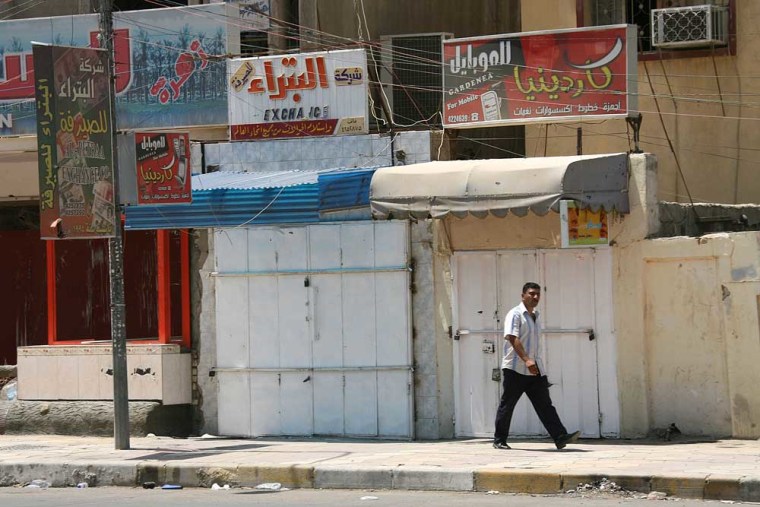Haidar Ali used to worry about whether to stock three-piece suits or casual wear in his boutique. Now he worries about feeding his children.
Ali, a Shiite Muslim and a father of two, closed his shop — Ambassadors’ Fashion — in the mostly Sunni neighborhood of Azamiyah, fearing sectarian attacks might cost him not just his business but his life.
“Now, I am trying to minimize my consumption to the spend the least,” said Ali, whose boutique used to earn him up to $900 a month — a handsome income in Iraq.
He now dips into his savings just to put food on the table. The family eats meat only once a week and no longer vacations in neighboring Syria and Jordan.
“The kids understand,” he said.
Sectarian violence and rising crime are transforming Baghdad’s once bustling commercial hubs into deserted streets — leaving the country’s economy in tatters. Popular markets in neighborhoods such as the Sunni Azamiyah and Shiite Kazimiyah have all but disappeared.
Violence delays deliveries
Merchants are shuttering their shops not only because they fear attacks but also because they are unable to keep their shops well-stocked.
Bombings, hijackings and checkpoints delay deliveries. Customers shy away from shopping in parts of town where their sect is in the minority.
“We used to get our supplies from the wholesale in Sadr City,” said Ahmed Ismail, a 55-year-old Sunni vegetable vendor. “But many of my fellow (Sunni) vendors were killed there. Who dares to go there?”
In Kazimiyah, jewelry stores have folded after driving restrictions and checkpoints discouraged customers from reaching their shops. In Mansour, once among the capital’s most prosperous neighborhoods, gunmen last month threatened some store owners with death if they didn’t close.
Fliers containing the warnings were slipped under the doors of boutiques, bookstores and bakeries owned by Shiites, Sunnis and even Christians. Some merchants who defied the orders lost their lives to drive-by shooters.
All this adds yet another element to the sense of gloom spreading over Baghdad as the U.S. and the Iraqi government struggle to contain the violence, which surged after February’s bombing of a Shiite shrine in Samarra and the wave of reprisal attacks against Sunnis that followed.
Staying home
Baghdad residents are increasingly staying home, changing their routes or giving up jobs in areas where they feel at risk from the rival Muslim sect.
Saad Abbas, a 26-year-old Shiite building contractor, used to work as a foreman on construction projects in Sunni neighborhoods. He stopped after some of his friends were waylaid by Sunni gunmen and killed because they had Shiite names.
“I’m too afraid to work outside Sadr City now,” he said. “So I have to accept any work I can get, even a simple laborer, as long as it’s inside our city.”
Fear has driven many Iraqis to take low-paying jobs deemed safer — even at the cost of abandoning businesses into which they had sunk their life savings.
Omran Abdul Salam, a Shiite, shut down his booming mobile phone store after receiving a death threat. Now he peddles cigarettes on the curb.
“It’s not a good source of income for a father of four,” he said. “But it’s better than losing my life.”
Falah Hassan al-Dulaimi, a Sunni, went from being a partner in a car dealership to driving a taxi. Gunmen kept stealing the cars and asking for money, “and I paid more than once until I lost all my money and my share in the business,” he said. “I’m thinking of leaving the country.”
High unemployment
The decline in commerce comes despite renewed efforts by the United States to help Iraqis revive their economy, still moribund more than three years after the U.S.-led invasion toppled Saddam Hussein.
No reliable figures on unemployment are available, but some estimates put the figure as high as 40 percent nationwide — higher in areas of western Iraq where the Sunni insurgency is widespread.
Last month, U.S. Commerce Secretary Carlos Gutierrez signed an agreement with the Iraqi government to strengthen the country’s economy and lure foreign investment into a nation with the world’s third-largest proven petroleum reserves.
But until the security situation improves, economic revival seems a distant dream.
“Iraq’s current situation shows that building a new nation is about more than going to the polls and creating coalition governments,” said Michael O’Hanlon of the Brookings Institution.
“Democracies cannot succeed unless they protect their peoples, guarantee the rights of their minorities, and make it possible for their economies to grow and their peoples to prosper,” he said.
